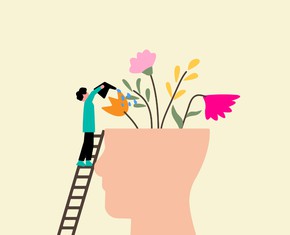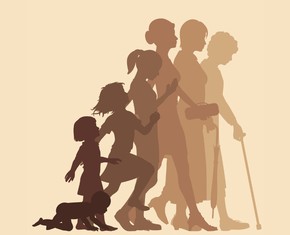The views expressed in our content reflect individual perspectives and do not represent the authoritative views of the Baha'i Faith.
I can’t explain the phenomenon of synchronicity, but it does seem sometimes that an idea presents itself in multiple ways within a short period of time.
Have you noticed this phenomenon in your own life? This has been happening to me lately through stories in newsletters, magazines, and television programs. Specifically, they’re reporting about how and when humans develop our sense of morality.
I used to think that morality, as a character trait, developed concurrently with intellect and social skills. Increasingly, research suggests there may be more to this than previously suspected.
While reading and watching current stories, I recall seeing a few years ago a vividly portrayed exploration into the origins of morality in an episode of the television program 60 Minutes. It showed films of real babies (some as young as 3 months) interacting with puppets, graham crackers, and Cheerios. Through ingenious use of these props and some simple words, the researchers examined several abstract character traits including morality, justice, and generosity. Again and again, most of the babies favored puppets that helped other puppets.
It seems that we have an inborn sense of goodness, altruism, and justice from the earliest age.
The study also showed that most babies and young children favored puppets that liked the same food they did. Interpreted as a tendency to identify with one’s “people,” this would have had survival value from an evolutionary standpoint. We might question now whether this is still a valuable tendency—or do we now prefer social norms that are more inclusive?
Yet another phase of this research studied slightly older children. Their behavior varied more than that of the younger ones, though usually they were generous, even forgiving. The observed differences among these older children are not surprising, since they had had more opportunities to learn and develop individual behaviors and attitudes.
There was more to this study than I am sharing here, but already there is much to think about. Obviously, there will be huge variation among life experiences as well as a host of other factors including biological and biochemical conditions; physical strengths and limitations; cultural perspectives; and socioeconomic factors—just to start the list. But we cannot overlook the impact of learning on reinforcing personal qualities. A society that values specific traits will seek to instill them in children and the community-at-large.
Though the tendency to identify with our own people may help to strengthen family and tribal relationships, it can also lead to prejudices and an “us vs. them” mentality. So a society that values diversity will intentionally encourage children and its residents to be inclusive, thus demonstrating freedom from prejudice.
As humans, we have animal-like instincts as well as spiritual qualities. Like animals, we seek satisfaction of our physical needs. Necessary as this is, it can potentially lead to jealousy and prejudice. As spiritual beings, we can go beyond these self-centered impulses.
If I think of my character as being developed throughout life, then I can see myself on a journey. The result will be a combination of what I encounter in life and my own free will. In the words of Baha’u’llah: “Noble have I created thee, yet thou hast abased thyself. Rise then unto that for which thou wast created.” – The Hidden Words, p. 9.
This passage clearly states that everyone is born in a noble state. It also reminds me that if I lose touch with my own nobility, then within myself is the ability to return to that state through my own free will.
Human behavior is far too complex to try to explain through some selected bits of research or a few simple ideas. But the role that education in its many forms has on our character development is undeniable, as it reflects what we collectively value and practice. German lawyer and author Udo Schaefer explained it this way:
The ideal character is not a product of nature … Its development is the ultimate goal of all education and self-education: it is a constant challenge throughout an individual’s life. – Baha’i Ethics in Light of Scripture, Volume 2, p. 26.
In this context, education includes not only academic curricula (which might have a component of expressing social values) but also social experiences, practical lessons, moral training, and the role model offered by teachers and other adults.
Prejudices come from family, friends, community, and mass media. Whether this happens intentionally or not, we are surrounded by biases. As such, we must be vigilant about racist or prejudicial statements; and we must guard against social, educational, or political systems that seek to exclude rather than include.
I cannot deny that some people do terrible, even evil things. History as well as the daily news is full of these stories. I am not so naïve as to think that this will end, that in the future everyone will be good and kind. I also realize that sometimes loving, well-intentioned parents have children whose behavior is troublesome and inexplicable.
To offer a compromise for the ongoing “nature vs. nurture” debate: I believe that we can consciously reinforce children’s natural tendency toward goodness, and we can nurture an acceptance of others. The word “educate” comes from Latin and means “to lead.” We adults can set an example of welcoming others. Loving qualities are innate; but maintaining them through life is neither guaranteed nor inevitable.
















Comments
Sign in or create an account
Continue with Googleor